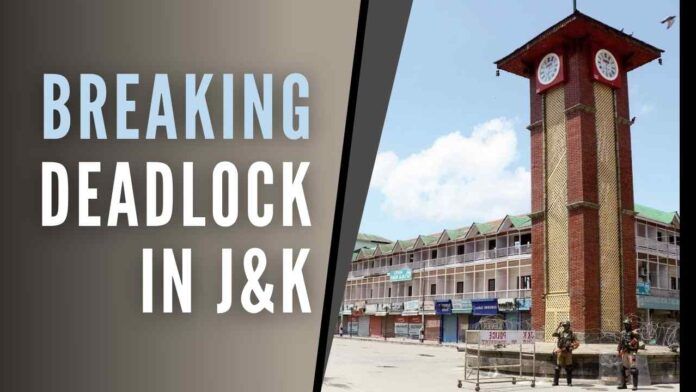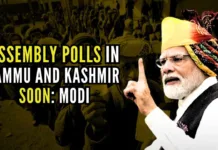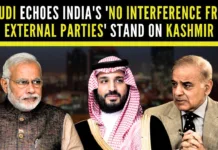
J&K Delimitation Commission panel meet
Justice (Retired) Ranjana Prakash Desai-headed Delimitation Commission met five associate members – three from NC (Farooq Abdullah, M A Lone, and Hasnain Masoodi) and two from BJP (Mos in PMO Jitendra Singh and Jugal Kishor Sharma) — on December 20 in New Delhi and shared its proposal with them. The proposal provided for 47 seats for Kashmir in the 90-member assembly of UT of J&K, as against 46 seats the highly biased Justice K K Gupta-headed Delimitation Commission allotted to the Valley in 1995. As for Jammu, the Delimitation Commission proposed 43 seats, as against its share of 37 seats under the 1995 Delimitation Commission.
In other words, the new panel proposed six out of seven additional seats for Jammu, one each in Kathua, Samba, Udhampur, Rajouri, Doda, and Kishtwar districts, and one for Kashmir in the Kupwara district. In the erstwhile J&K assembly, Kashmir and Jammu province returned 83 members (Kashmir 46 and Jammu 37). The new panel didn’t propose any change in the existing share of SCs in the assembly. They had seven reserved seats before and they will continue to have seven seats – all in Jammu province. The panel also proposed nine seats (10%) for the STs and it happened for the first time. The STs inhabit many areas both in Jammu province and Kashmir.
The new panel, in addition, explained the criteria adopted by it while drafting the proposal. It, inter-alia, said that it proposed 47 seats for Kashmir and 43 for Jammu taking into consideration the 2011 census data and geographical factor (area, nature of terrain, and accessibility) and means of communication.
Jammu feels betrayed
The people of Jammu province wanted the new panel to delimit assembly constituencies on the basis of the 2021 census figures and four other factors – land area, nature of terrain, accessibility, and means of communication. Their age-old grouse was that the 2011 census figures were manipulated in favour of Kashmir. Their view was that they would have got no less than 50 seats, had the 2011 census been a fair exercise and the 1995 Commission taken into consideration the other factors. That the new panel considered the 2011 census data as envisaged by the J&K Reorganization Act of 2019 has only disappointed the people of Jammu province.
The disappointment and unhappiness of the people of Jammu could not be dismissed as silly and preposterous. They do make a valid point by bemoaning that they again were denied a due share of representation in the assembly, which discusses and decides questions of supreme importance to the happiness and well-being of the people. Remember, Jammu has all along been superior to Kashmir both in terms of population and land area and inferior to Kashmir in terms of the nature of the terrain, accessibility, and means of communication. It also needs to be underlined that Kashmir will have four seats more than Jammu and as a result, it will continue to dominate the state polity and economy to the disadvantage of Jammu as before.
Opposition in Kashmir
It must remain a matter of concern that all Gupkaris and others in Kashmir, including Omar Abdullah (NC), Mehbooba Mufti (PDP) and M Y Tarigami (CPI-M) – all Gupkaris -, Altaf Bukhari (JK Apni Party), Sajjad Lone (PC) and G N Monga (Congress), all in one voice denounced the Delimitation Commission and the BJP Government at the Centre. The Gupkaris accused the Delimitation Commission of promoting the “political agenda of the BJP and serving BJP’s political interests”; termed the proposal anti-Kashmir, “unacceptable” and “divisive”; declared that “they will not sign the Delimitation Commission report”; and reiterated their demand seeking delimitation of the constituencies only on the basis of the 2011 census data. “This commission has been created simply to serve BJPs political interests by dividing people along religious & regional lines. The real game plan is to install a Government in J&K which will legitimize the illegal & unconstitutional decisions of August 2019,” one of the Gupkaris also said. The refrain of the Gupkaris, in short, is that the whole delimitation exercise is aimed at “dis-empowering Kashmiris (read Muslims) politically” and helping the BJP (read Jammu) establishing its rule in the UT of J&K.
The NC, which heads the Gupkar gang, also took on the associate members belonging to the BJP. They particularly targeted Jitendra Singh, who while speaking to media persons in New Delhi after the meeting with the Commission had claimed that all the associate members from the NC were satisfied with the working of the Delimitation Commission. The NC vice-president Omar Abdullah, in fact, termed as “misleading” the statement of Jitendra Singh that “the associate members regardless of their party and political affiliations not only appreciated the work done by the Delimitation Commission but also committed that they would in the future also extend their cooperation for the rest of the exercise”. So much so, he accused Jitendra Singh of “misrepresenting and distorting the facts with malicious intention” and made it loud and clear that “the party (NC) will not be a signatory to this report”.
Bukhari, Lone, and Monga took almost the same line. Terming the proposal “biased and undemocratic, they, among other things, said that the proposal of the Delimitation Commission, if accepted and implemented, “will alter the electoral map of J&K”, “skewed the balance of power” and “increase gaps between regions and communities”.
All this only serves to indicate the extent of their opposition to the genuine demand in Jammu seeking a fair share of representation in the legislature. But more than that, all this suggests that the Gupkaris and others in Kashmir consider Jammu as a Kashmir’s colony and people of Jammu province as no more than subjects whose life is not one of the political and economic aspirations.
Congress trifurcates Jammu
AICC leader and former J&K CM Ghulam Nabi Azad took a line totally different from the Gupkaris and others in Kashmir. He said Jammu deserved six out of the seven additional seats. Six additional seats should be created in the erstwhile Doda district and Kathua and Udhampur districts. At the same time, he shocked the people of Jammu province by asserting that Jammu province is not one organic political unit and that it consists of three distinct regions. “There are three regions in Jammu Division, including Chenab, Pir Panjal and Central region, including Jammu-Udhampur and Kathua parts,” he said in Doda. He willfully overlooked the fact that the erstwhile Doda district and Poonch district and parts of Rajouri district are located in the same mountain range, called the Pir Panjal Mountain. The truth is that he only promoted the agenda of those who had been seeking to create a Greater Muslim Kashmir and pit one section of the people of Jammu against another to establish Kashmir’s stranglehold over Jammu province and deny what the Jammu province legitimately deserved in the polity of the state and the country. It would not be out of place to mention that in 2007, GN Azad had proposed a 25% increase in the number of seats in the assembly both for Jammu province and Kashmir, saying he believed in the principle of justice and regional equality.
Breaking the deadlock
One thing is clear. The Delimitation Commission just can’t afford to decrease the number of seats as it proposed for Jammu, where the concerned people are already chaffing and seething with anger. Similarly, the Gupkaris and others in Kashmir will under no situation accept the proposal as shared with them by the Commission. They would find no place in Kashmir to hide if they accepted the 47 and 43 seat proposals.
What, then, could break the impending deadlock? The separation of Jammu province from Kashmir alone could break the deadlock. The whole truth is that Jammu province and Kashmir have been disparate regions ever since March 1846, when Kashmir was merged with the Dogra Kingdom under the Treaty of Amritsar, signed between Maharaja Gulab Singh and the British Government. These disparate can’t be maintained as one political unit. The sooner the Narendra Modi Government accepted this reality, the better for the nation, better for Jammu, and better for Kashmir.
Note:
1. Text in Blue points to additional data on the topic.
2. The views expressed here are those of the author and do not necessarily represent or reflect the views of PGurus.
PGurus is now on Telegram. Click here to join our channel and stay updated with all the latest news and views
For all the latest updates, download PGurus App.
- ‘Kashmir My core constituency’: Revisiting July 12, 2003 to understand politics, Omar Abdullah-style - March 15, 2024
- Total deviation from traditional approach: Seven takeaways from PM Modi’s March 7 Srinagar visit - March 9, 2024
- Status of political parties: Why is further J&K reorganization imperative? - March 1, 2024










